Can You Get Legally Married at Home in the UK? Your Guide to a Cozy Ceremony
Planning a wedding can be a whirlwind of excitement and decisions, especially if you’re considering a unique setting like your own home. You might be asking, “Can you actually have a legal wedding at home in the UK?” Yes, you can get legally married at home, but your property must be approved as an official venue by the local authority, especially in England and Wales. This requirement ensures your home meets certain standards to host such an event.
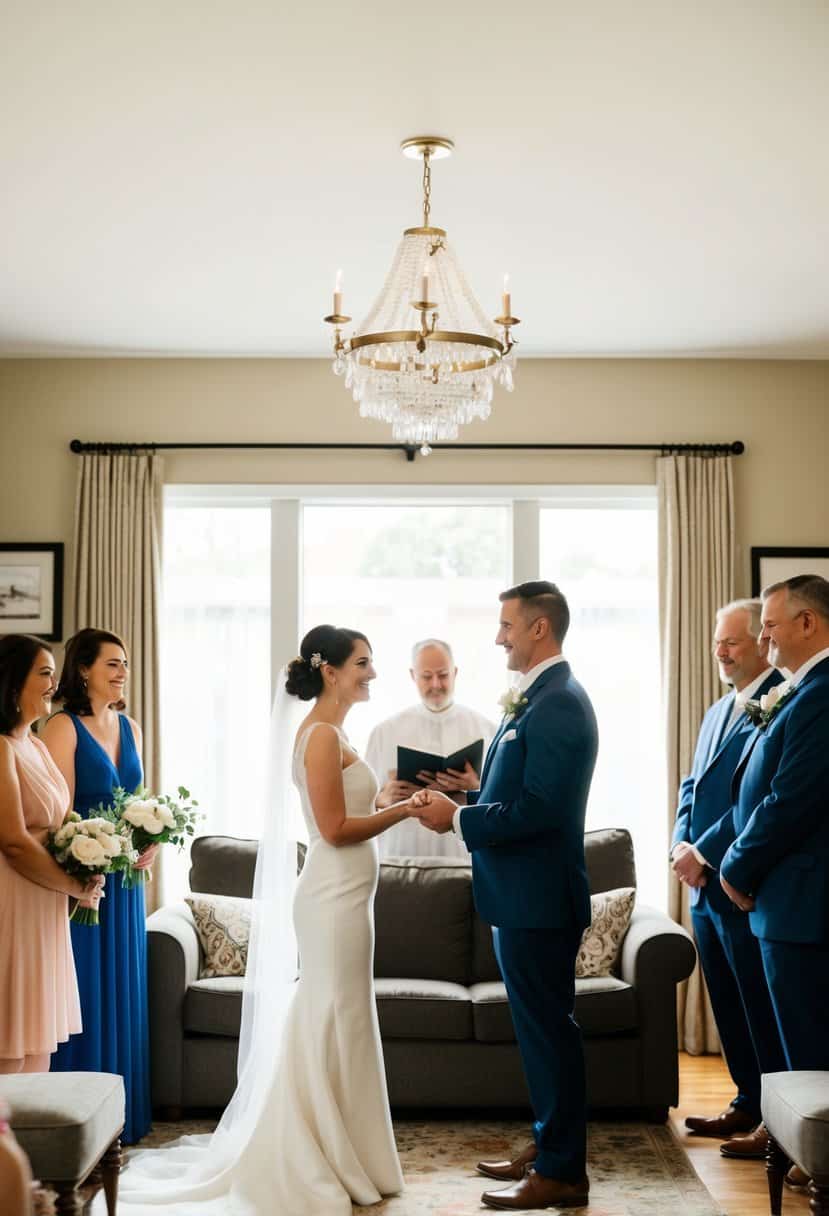
Choosing to have a home wedding can provide an intimate and personal setting that many couples find appealing. However, obtaining a license can come with certain obligations. For instance, once your home is licensed, it might be available for others to use for their weddings.
If you’re thinking about this option, it’s important to consider both the legal aspects and the logistics involved. With the right planning, your home could become a charming backdrop for a day filled with love and joy.
Legality of Home Weddings in the UK

In the UK, getting married at home can be challenging due to legal requirements. This section explores the legal aspects of civil and religious ceremonies in private residences.
Civil Ceremonies at Home
Civil ceremonies in the UK are required to take place at approved premises. Your home usually doesn’t meet these requirements, making it difficult to have a legally binding civil ceremony at your residence. Approved premises are typically public places, like registry offices or licensed venues. You might face limitations if you’re hoping to marry at home.
If a home wedding is essential to you, consider having a non-legal ceremony at home first. You can later formalize it with a legal ceremony at an approved location. This approach allows you to celebrate in the comfort of your home, without legal complications.
Religious Ceremonies in Private Residences
Religious ceremonies offer some flexibility compared to civil ones. If you wish to have a religious marriage at home, you’ll need to work with an authorized religious leader. Some religious leaders can perform legally recognized ceremonies in private residences if permitted by their faith.
You’ll still need to meet specific legal requirements, such as giving notice and obtaining the necessary documents. It’s essential to discuss your plans with your chosen religious leader to ensure everything is valid. Always verify with your local registry office to confirm legal aspects and procedures.
Requirements for a Legal Marriage at Home
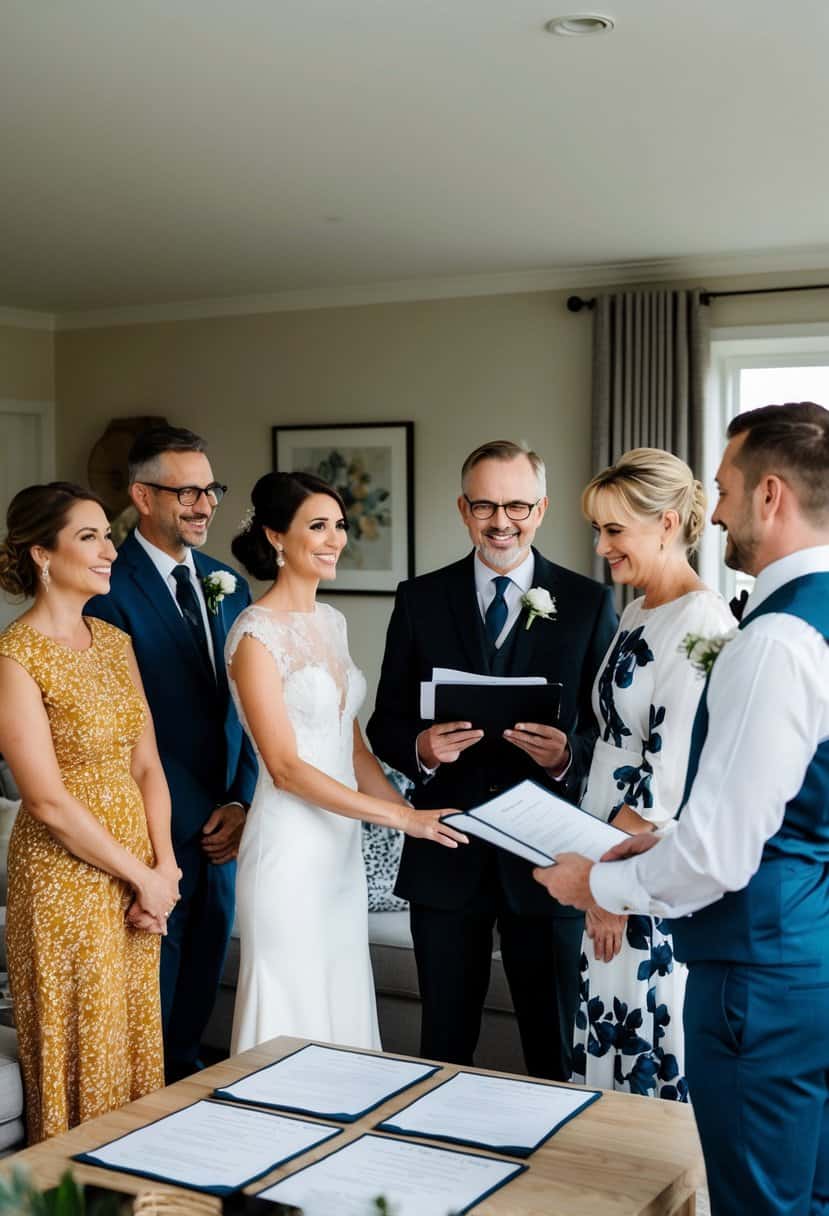
Getting married at home in the UK involves specific legal steps. You need to follow the correct process, including giving a notice of marriage and obtaining a marriage certificate. Each step ensures that the marriage is legally recognized by family law.
Notice of Marriage
To marry at home, you must first give a notice of marriage at your local register office. This legal requirement involves declaring your intention to marry. You need to give notice at least 29 days before your wedding date. Both parties must attend the appointment together.
The notice will include details such as your name, age, and nationality. You may also need to provide documents, like your passport or birth certificate, to prove your identity and eligibility to marry. If either of you were previously married, you’ll need to show evidence that you’re legally free to marry again.
Make sure you reside in the area where you give notice for at least seven days before your appointment. Once the notice period is complete, it will be publicly displayed at the register office. This gives others a chance to raise any legal objections.
Marriage Certificate
After your wedding ceremony, obtaining a marriage certificate is essential. It serves as the official document proving your legal marriage. You’ll usually get the certificate from your local register office.
This certificate is important for various legal reasons, like changing your name or updating marital status on official documents. It’s a good idea to request additional copies of your marriage certificate. They can be useful for dealing with financial matters, like joint bank accounts or property ownership.
Your marriage certificate will contain important details, including the names of both partners, the date, and location of the marriage. It’s a valuable document that confirms the legality of your union according to family law.
Specifics for England and Wales
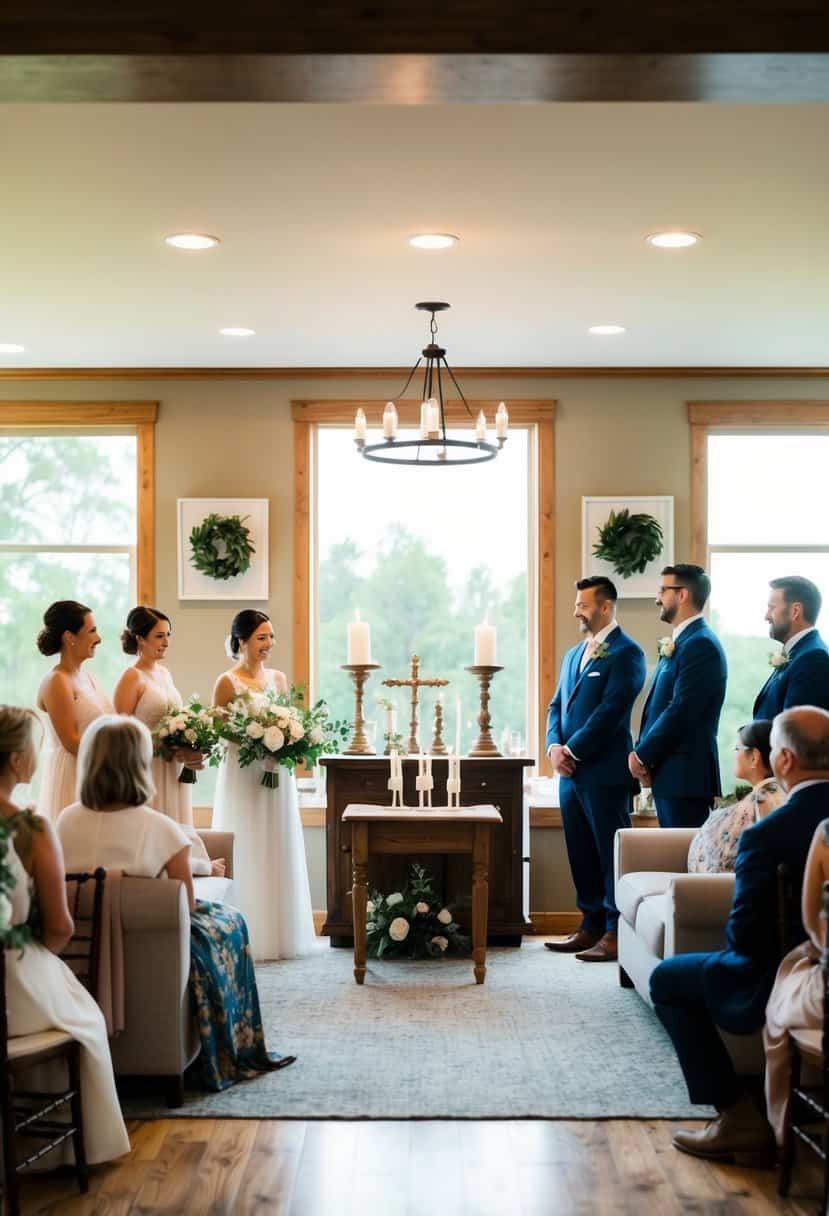
In England and Wales, getting legally married at home involves specific regulations. It’s important to understand the laws about approved premises and the options for outdoor or virtual weddings. This knowledge will help ensure your wedding ceremony meets legal requirements.
Approved Premises Regulations
In England and Wales, marriages must take place at specific venues that hold a license under Approved Premises Regulations. This means your home typically cannot host a legally binding ceremony unless it is approved as a wedding venue. A registrar must be present to carry out the ceremony. Your venue can help arrange for a registrar, or you can book one yourself.
While this process is straightforward in licensed venues, getting your home approved for marriage ceremonies involves allowing others to use it for similar events. Make sure this aligns with your privacy preferences before proceeding. The requirement for two witnesses ensures all ceremonies are documented correctly and legally recognized. It’s a necessary step to making your marriage official.
Outdoor and Remote Wedding Options
For couples interested in outdoor weddings, recent changes allow these ceremonies at licensed venues in England and Wales. Outdoor weddings are now permanently legal after receiving strong public support. This means you can enjoy a natural setting while ensuring the ceremony is legally binding.
Virtual weddings or online marriages are not currently recognized as legal in England and Wales. If you’re considering a virtual celebration, it’s essential to understand it won’t officially count as a legal marriage. Instead, focus on finding a venue that accommodates your desires for an outdoor experience. This approach combines the charm of a remote setting with the assurance of legal compliance.
Immigration and Spousal Considerations
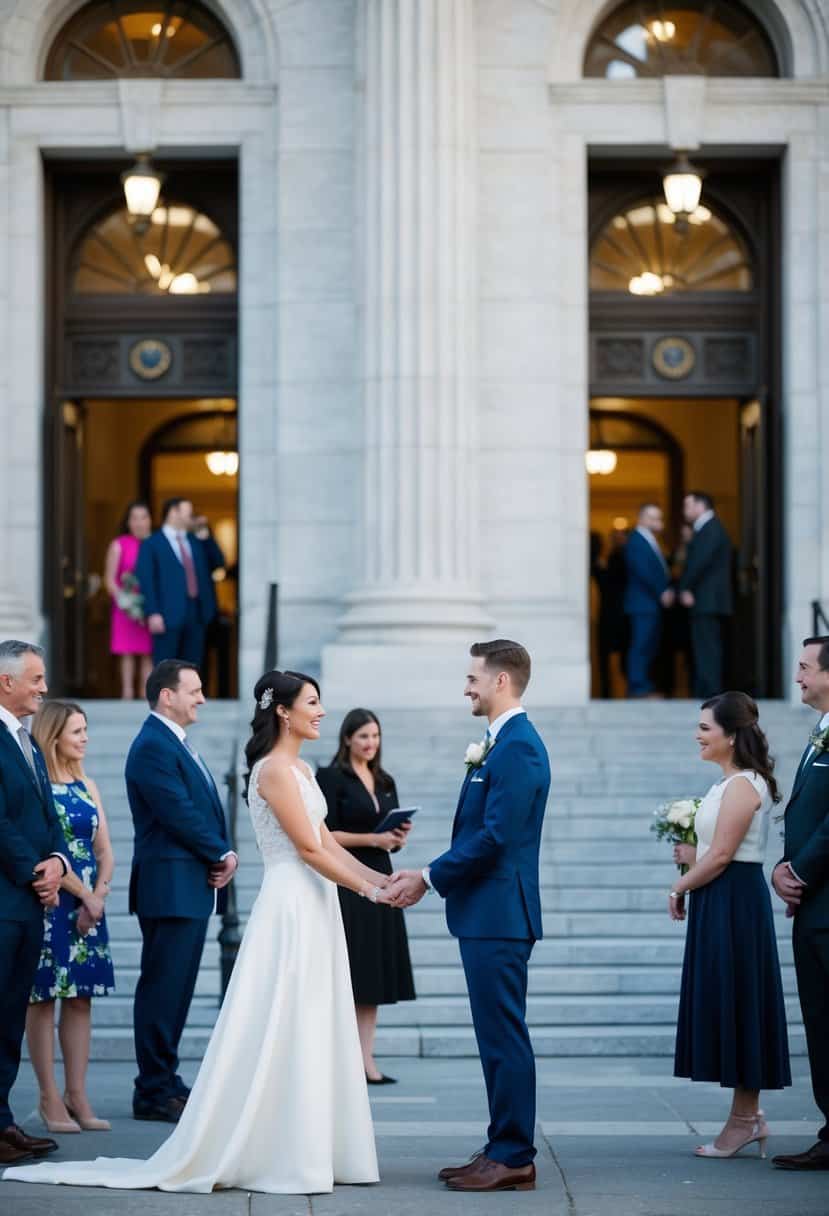
When getting married at home in the UK, you may need to think about immigration aspects, especially if your spouse is a non-British citizen. The legal recognition of marriages performed overseas can also play a crucial role.
Spouse Visa for Non-British Citizens
If your partner isn’t a British citizen, you might need to look into a spouse visa. This allows your spouse to live in the UK with you. To apply, you’ll need to prove your marriage is genuine and show you can support yourselves financially.
You’ll provide documents like your marriage certificate and evidence of income and accommodation. An immigration attorney can help with the process by ensuring all paperwork is correct and deadlines are met.
Consider the visa application fee and the NHS surcharge, which are essential parts of the process, so you should be prepared financially. Keep in mind, processing times are significant, so starting the process early is beneficial.
Legal Recognition of Overseas Ceremonies
If you’re considering an overseas ceremony, you’ll want to ensure it’s legally recognized in the UK. Generally, your marriage should be valid under the law in the country where it took place. This means an official ceremony with appropriate documentation is essential.
After the ceremony, you’ll need your marriage certificate to be translated into English. The UK accepts many international marriage certifications but checking specifics is wise. Some cases might still require registration in the UK for full recognition.
Consulting with an immigration attorney can clarify these requirements. They can offer guidance if you’re worried about recognition and any potential complications that might arise with a foreign marriage.
Planning and Consultation for Your Home Wedding
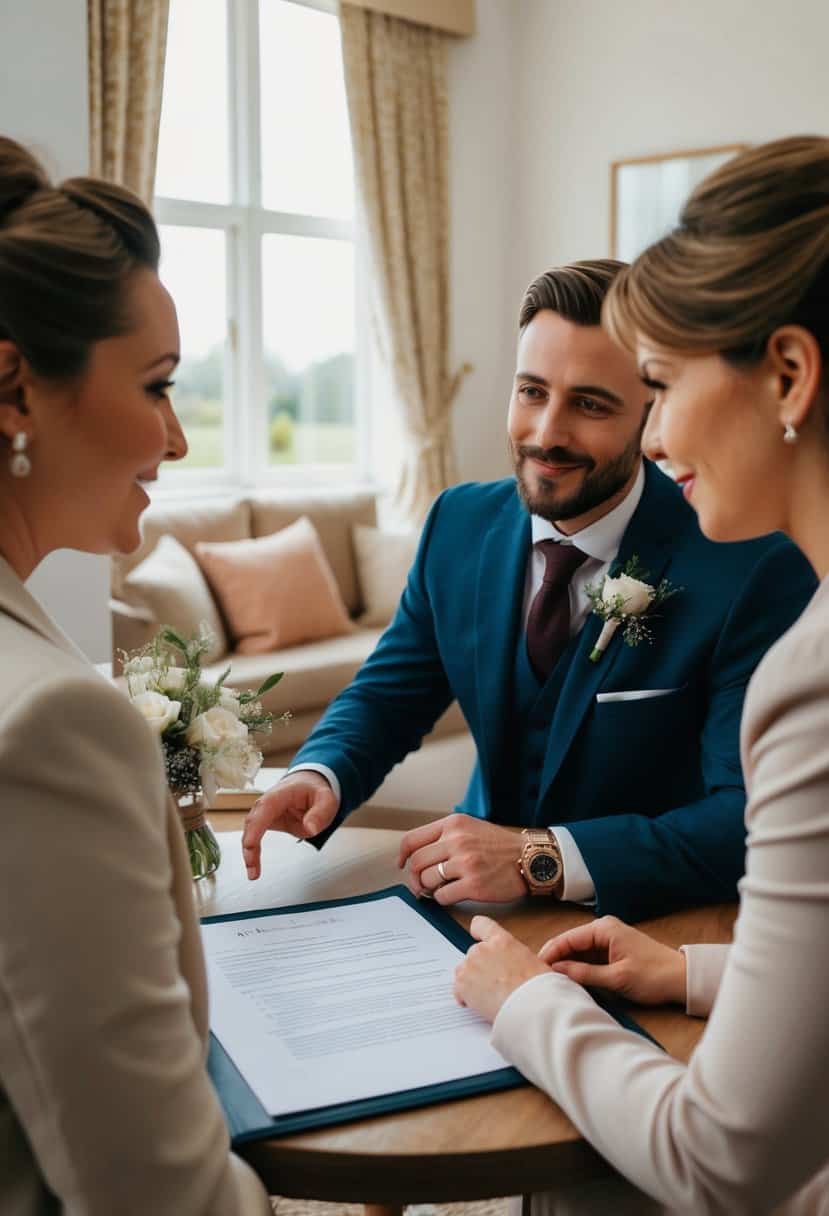
Planning a home wedding requires coordination and attention to detail. Two key aspects to focus on are hiring an independent celebrant and consulting with wedding sector professionals to ensure your special day runs smoothly.
Hiring an Independent Celebrant
Choosing an independent celebrant can give you the freedom to create a personalized and meaningful wedding ceremony. Unlike traditional venues with set ceremonies, an independent celebrant allows for a bespoke experience. You can incorporate personal anecdotes, unique vows, or cultural elements into your ceremony, making it truly special.
An independent celebrant can meet with you to discuss your vision and preferences, ensuring the ceremony reflects your relationship. It’s helpful to hire a celebrant early, as their schedules can fill up quickly. During consultation, communicate any specific needs or themes you wish to include, as this ensures they tailor the ceremony to your desires. A well-chosen celebrant sets the tone for your wedding day and helps create lasting memories.
Consulting with Wedding Sector Professionals
When planning your home wedding, consulting with professionals from the wedding sector is essential. This might include caterers, florists, photographers, and planners. Each professional brings expertise that can help make your vision a reality and provide insight into what works best for home settings.
Ask these professionals about logistics and any potential challenges they foresee, especially related to home venues. Their experience can help navigate common issues, such as space constraints or weather concerns. Consider making a list of services you need, then schedule consultations. This approach streamlines planning and ensures you don’t overlook essential elements, creating a seamless celebration.

